Papua New Guinea
Pagwi: Gateway to the Sepik RiverPagwi: Gateway to the Sepik River
I started my journey to Pagwi from Wewak, the closest town on the coast, with the help of a friendly Christian security guard with two wives(!) and after a hair raising journey through bandit country to get there. My first stop was the town of Maprik and by Papua New Guinea standards the road there was amazing quality (and even passable by international standards). The journey took about 3.5 hours by public minibus, most of it through beautiful rolling jungle. It cost 25 kina (€5.92/$7.08), but this was the expensive bus. Apparently a lot of them are only 20 kina (€4.74/$5.67). A bit cheaper than the $100 a day to hire a car and driver that I’d read about online. We stopped once on the way at an area with some roadside stalls for food and I bought a fried sausage and banana from a friendly lady. It was delicious and covered in enough salt to kill a slug.
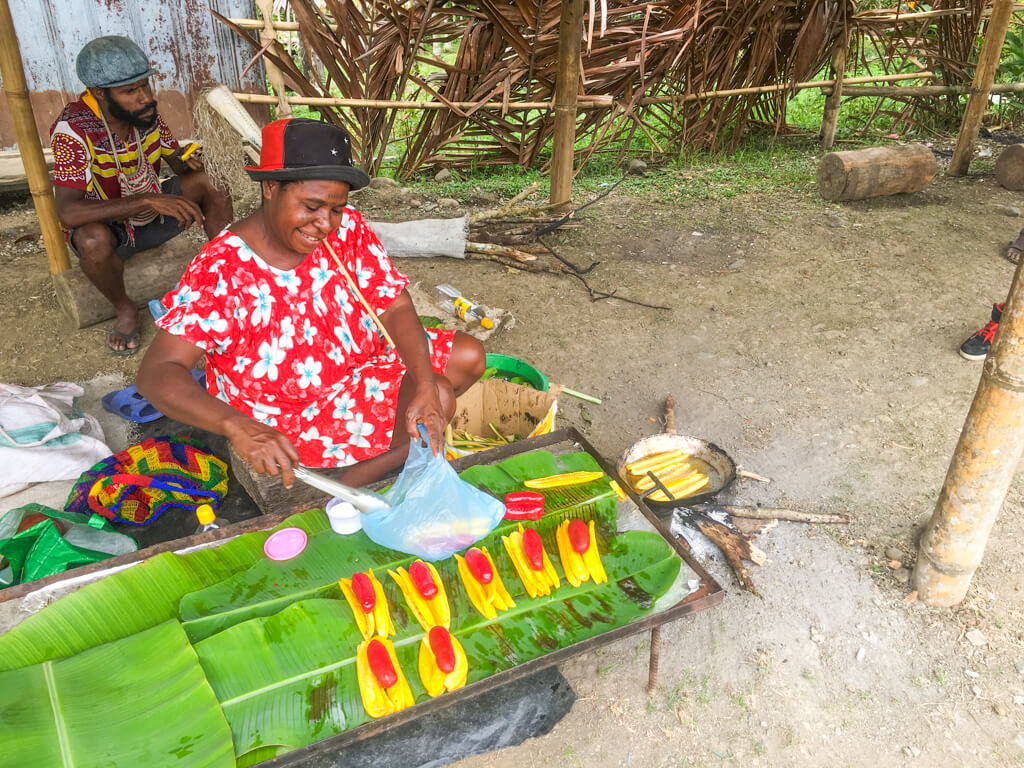
A local lady selling sausages and banana on the edge of the road. Total junk food, but also totally delicious.
First impressions of Maprik were not great. It looked peaceful, but was just a load of shops clustered in a jungle valley; not much different from the other towns I’d visited. My original plan was to stay two nights. After seeing it, I only wanted to stay one, but the next day was Sunday and public transport stops completely on Sundays. Getting off the bus, a couple of kindly middle-aged ladies asked where I was going and whether I needed any help. I said that I was looking for a place to stay and then going on to Pagwi on Monday, at which point they said they could take me to a guest house if I wanted and that it would cost about 100 kina (€24/$28) per night. Otherwise, a couple of boys they knew were going up to Pagwi in a few minutes, and if I wanted could give me a ride.
I glanced around the street and decided there was not much point staying, but I needed money for the Sepik river trip, as there are no ATMs on the river, so I asked about an ATM (I’d read that the town had one). The ladies pointed to a nearby BSP bank and a sign with opening times for the ATM – it was closed on weekends! “But don’t worry”, they said, “the boys have an EFTPOS machine and can give you cash from your card at their shop in Pagwi. I wasn’t sure I liked the sound of that – I try to avoid using my card except in ATMs and places like airports and shopping malls, because of the risk of fraud, but I had my back to the wall on this one.
Staying in Maprik didn’t really appeal, so I followed the ladies over to a pickup with two boys standing next to it. They introduced themselves as Genesis and Oscar, two cousins. “Their guest house in Pagwi is only 50 kina (€12/$14) a night,” the ladies said helpfully. I decided to take a chance with the card and hope it would work in the EFTPOS machine (and that my bank account wouldn’t mysteriously empty afterwards). We drove up to Pagwi, which only took about an hour, with a short stop for a delicious fresh coconut on the way up. The boys were very friendly, knew the river well, and gave me some tips on places to visit.
Roadside coconuts freshly cut with huge bush knives!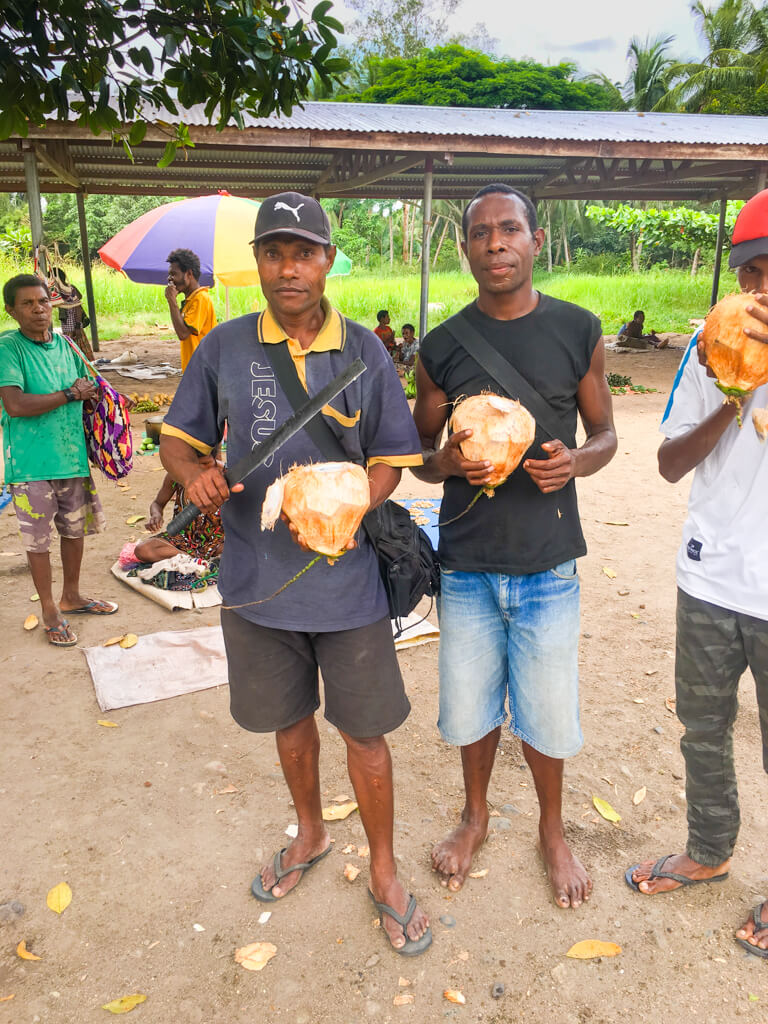
When we arrived, I was slightly in awe at the width of the Sepik. This is truly a great river, although its dingy green colour was a little off putting. Pagwi turned out to be a small hamlet on the riverbank and quite pretty, with palm trees and friendly villagers wandering around. I checked into the Sangra guest house, which was a slightly lopsided but very traditional-looking wooden building on stilts to keep it above the water level during the rainy season (approximately December to April). It had recently been repainted with traditional artwork depicting tribal scenes on its outside. The 50 kina a night price was absolutely correct, and Genesis, the son of the guest house owner, was able to give me 300 kina (€71/$85) cash out with the EFTPOS machine as well when I paid. I wasn’t sure how long that would last on the river, but it would help.
The Sangra guest house. The artwork has a slightly modern feel, but the beautiful pointy thatched roof is similar to older buildings I saw later on my Sepik journey.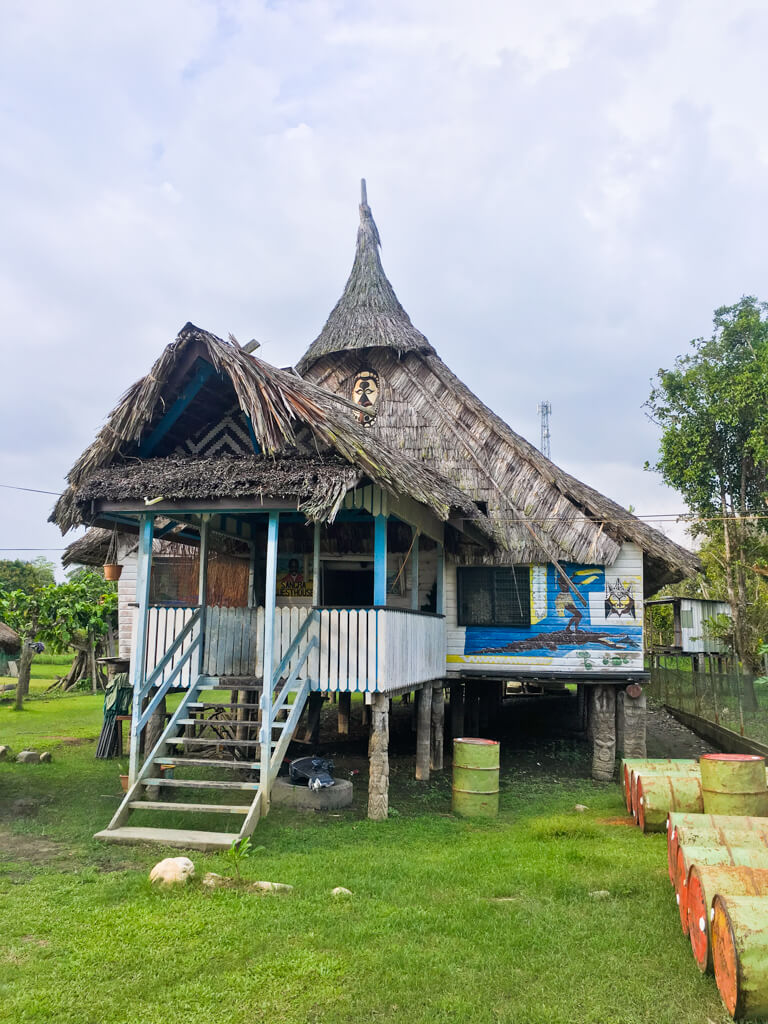
The beautifully decorated Sangra guest house in Pagwi,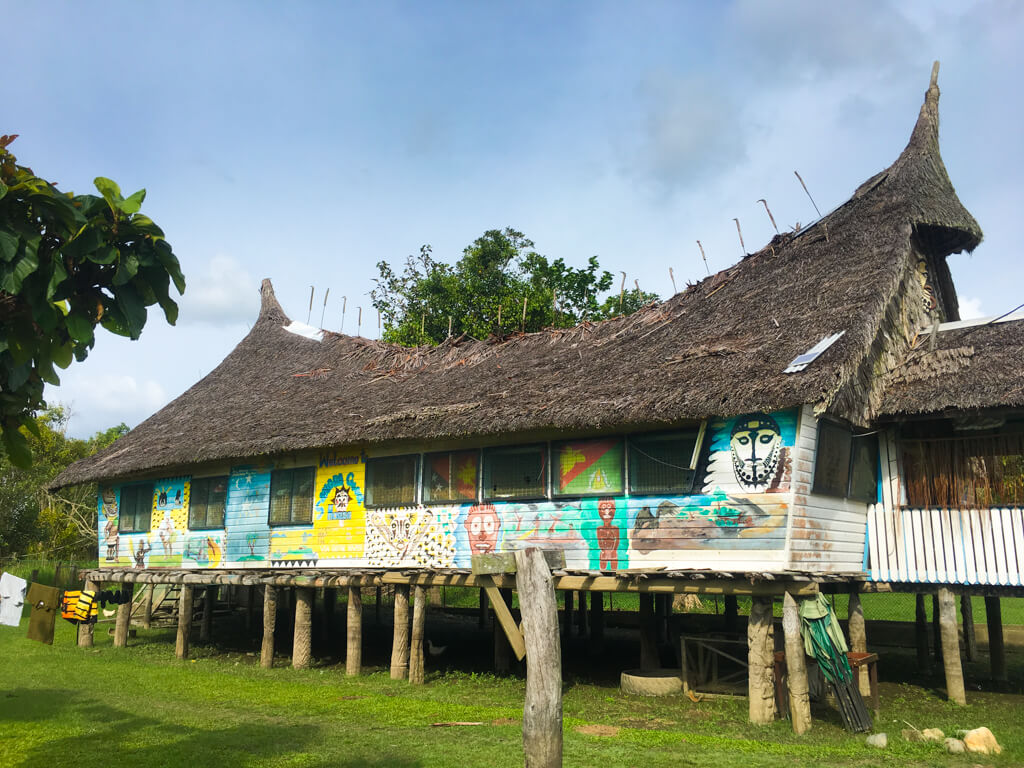
I spent the afternoon hanging around the guest house and chatting with Genesis, Oscar and a long line of other locals who came by for one thing or another. The guest house had a little restaurant and bar area out the back, also beautifully painted, but looking like it had seen better days. When I asked about the bar, Oscar told me that they’d had to close it because too many locals couldn’t hold their drink. “They come here to drink and end up starting fights,” he said, “in the end, it caused too much trouble, so we shut it down.”
Partway through the afternoon Simona, Oscar’s fiancee, cooked a delicious meal of chicken and rice, and they invited me to join them. No one asked for money, although a price list of meals is stuck to the guest house walls. After that, they cracked open a few beers and I joined them for that too, although I explicitly said I would pay for them, as I know that beer is quite expensive by local standards. We chatted until the sun began to set, when we moved outside and lit a fire in a vain attempt to chase away the mosquitos. Simona hooked her phone up to a speaker and played some music, and I learnt a lot about life on the Sepik as the conversation ebbed and flowed with the beer.
The Sangra guest house bar had sadly seen better days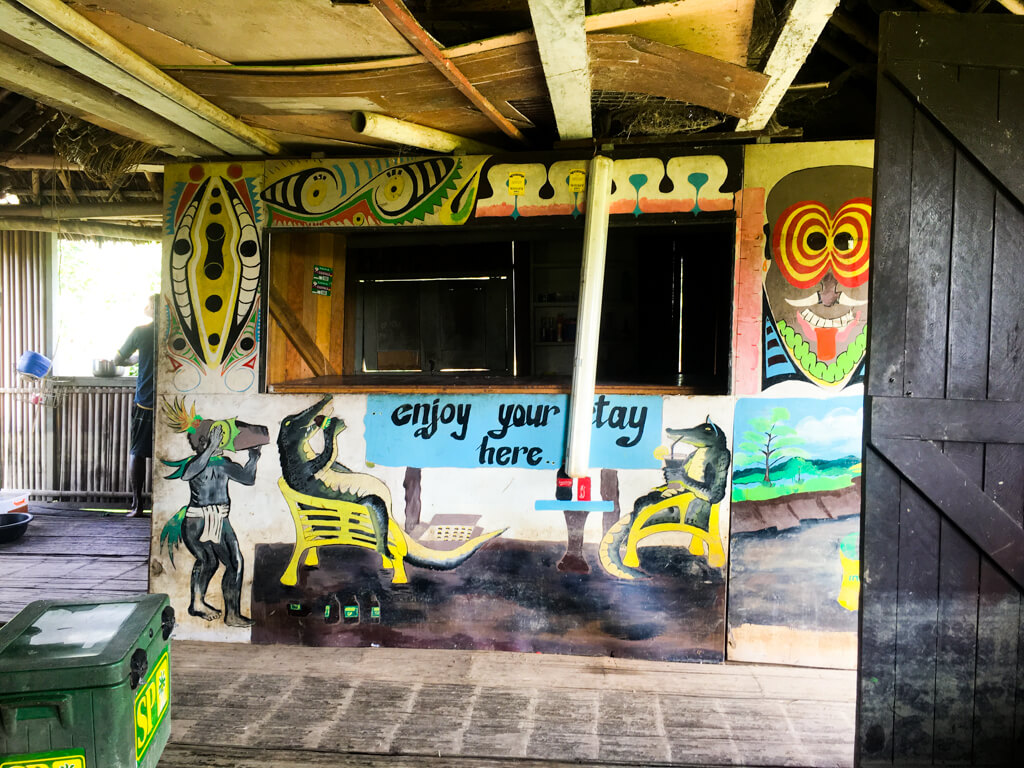
A basic but delicious meal cooked by Simona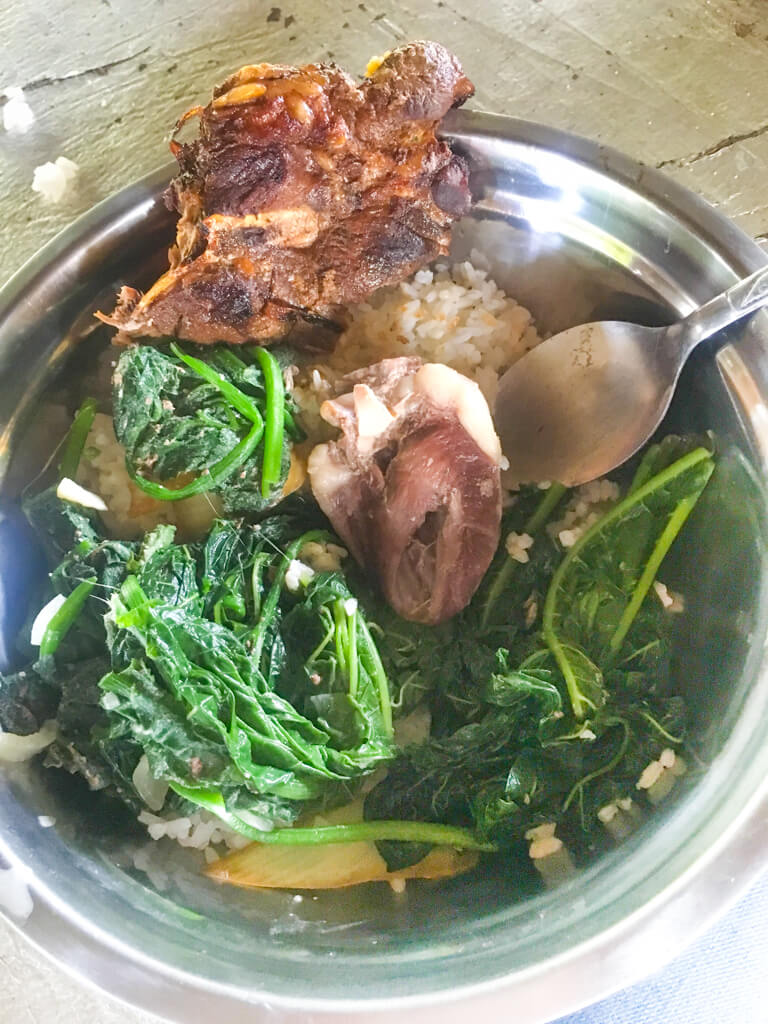
Sadly, certain topics come up over and over in this country, including alcohol addiction and violence. Oscar told me the story of a recent incident in the village on the other side of the river, in which a group of teenagers got drunk and had a fight with bush knives. One boy was seriously injured by another and his family retaliated by burning down the other family’s house. This led to counter-retaliation and so the conflict escalated. Eventually, eleven houses were burnt to the ground before the issue was put to rest. Such wanton destruction is extremely sad for a poor community, but there is not much for the kids to do except drink, and the adults are terrible role models, often drunk themselves by the late morning.
South Pacific Lager – The favourite poison of Sepik communities comes in deceptively beautiful cans. There is a different design based on the unique culture of each of PNG’s 20 provinces.
The other topic that came up repeatedly was the new Chinese mine under construction on the Frieda river, a tributary that feeds into the upper reaches of the Sepik. Almost everyone I spoke to saw it as a threat to their very survival. Around a million people live on the Sepik river and depend on it for water, transportation and, most importantly, food (fish and crocodile in particular). Mines don’t exactly have great safety records in PNG and one accident could endanger everyone who depends on the river for survival – I could see their point.
Both Genesis and Oscar mentioned at some point during the evening that it was nice to have a guest come and spend time with them. Apparently, most guests stayed in their rooms or sat at the front of the guest house, but didn’t really mix with the locals. I find that quite sad, as to me the highlight of my visit to PNG was meeting local people and learning about local customs and issues. Oscar and Simona also kindly offered to take me across the river in their boat the next afternoon and show me around the village on the other side. The party wound down about midnight and I retired to my room to sleep.
The next morning, I got up and went to brave the pit latrine to deal with some business that I couldn’t put off any longer. Afterwards, walking down to the river, I met Genesis and Oscar in a boat both holding cans of beer. Genesis was so drunk that I struggled to understand his words despite his very high level of English (he studied in Australia for 5 years). It turned out they’d run into some friends on the way home the night before and ended up drinking another case of beer, continuing until morning. I chatted to a few people on the river bank and then went on to the morning market, which was just winding down. There wasn’t much food left, but I managed to buy some fried dough balls and had a good chat with an older gentleman who spoke very good English and was curious to meet a Scot in PNG (he was a big fan of another Scot, a Mr Johnny Walker, who he told me is in excellent health despite having been born in 1805).
A dugout canoe with twin outboard motors prepares to transport barrels of fuel for use in the construction of the new Chinese mine on the Frieda River, and 18-hour journey up river. Pagwi’s little morning market takes place in the shade of a group of trees on the banks of the Sepik.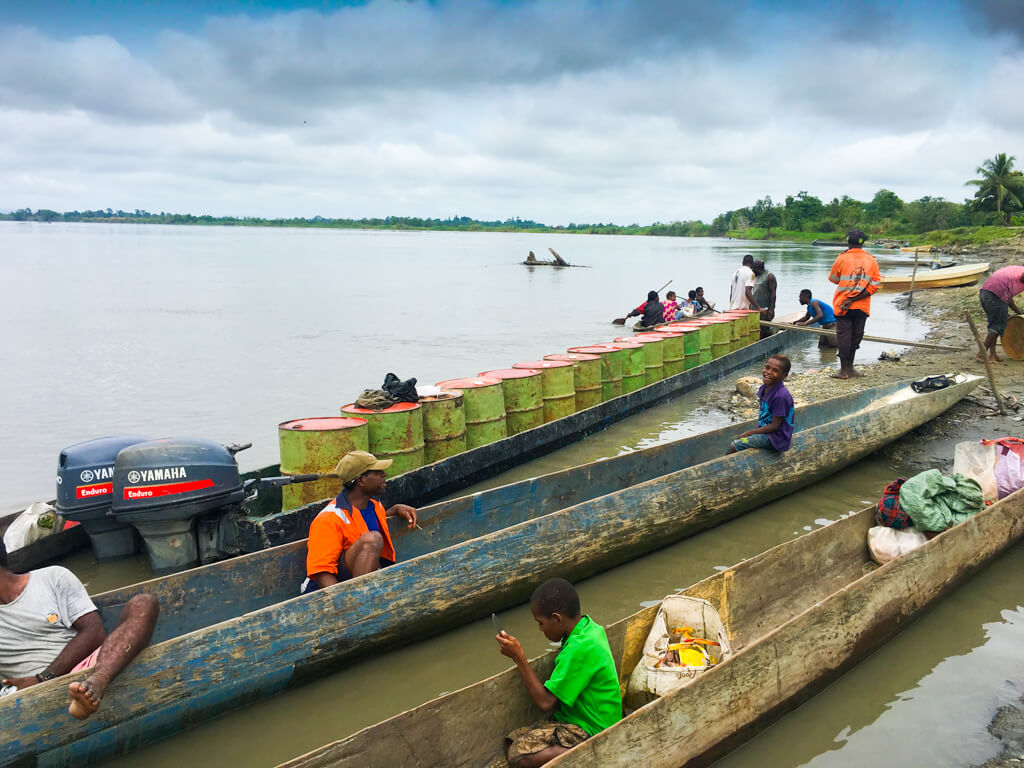
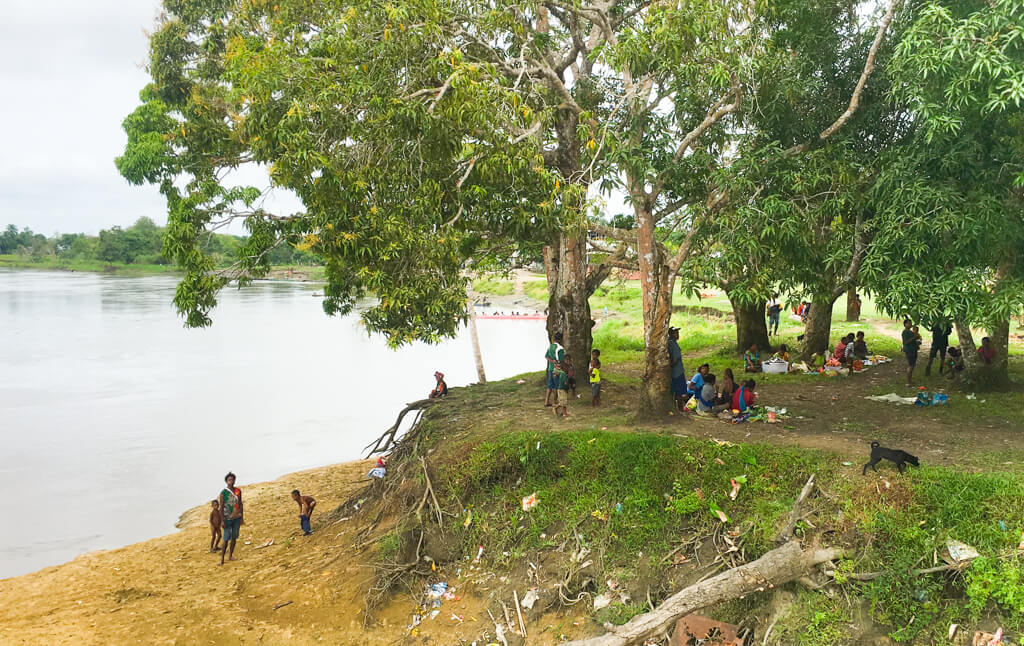
I spent the morning doing my laundry and then went to the living room/kitchen hut where I met Leo, the owner of the guest house and village shop, and a local government representative. Leo is also Genesis’s father and Oscar’s uncle. He is a well-educated, interesting and very friendly man, and we had a good chat. After a while, I saw some figures moving towards the hut and commented that Genesis was coming. “Genesis is a drunkard”, Leo snorted with contempt. Later that day, when I saw no sign of Oscar and mentioned to Leo that he’d offered to take me across the river that afternoon, he snorted again, “that won’t happen, he’s drunk”.
There were few boats crossing the river, so I gave up on visiting the opposite bank and decided to take myself for a walk around the village instead. I strolled along the main road in the direction of Maprik (the village only has one main road), and chatted with a few villagers along the way. Everyone was very friendly, although some looked a little surprised to see a lone foreigner wandering around. After a while, a couple of children joined me. When I asked their ages, they said they didn’t know, but I would guess they were around 10 and 13. A local man suggested that we walk around in a big loop, leaving the village by the main road and returning via a smaller path running through an area of jungle near the village school and church, and I jumped at the idea. The children came with me and we had a nice chat as we walked, with them telling me about the local wildlife, the eagles, and local hunting practices. Apparently, the villagers burn areas of bush so that the wild boars run out and they can catch and kill them for meat.
The Department of Finance, one of Pagwi’s more ornate buildings.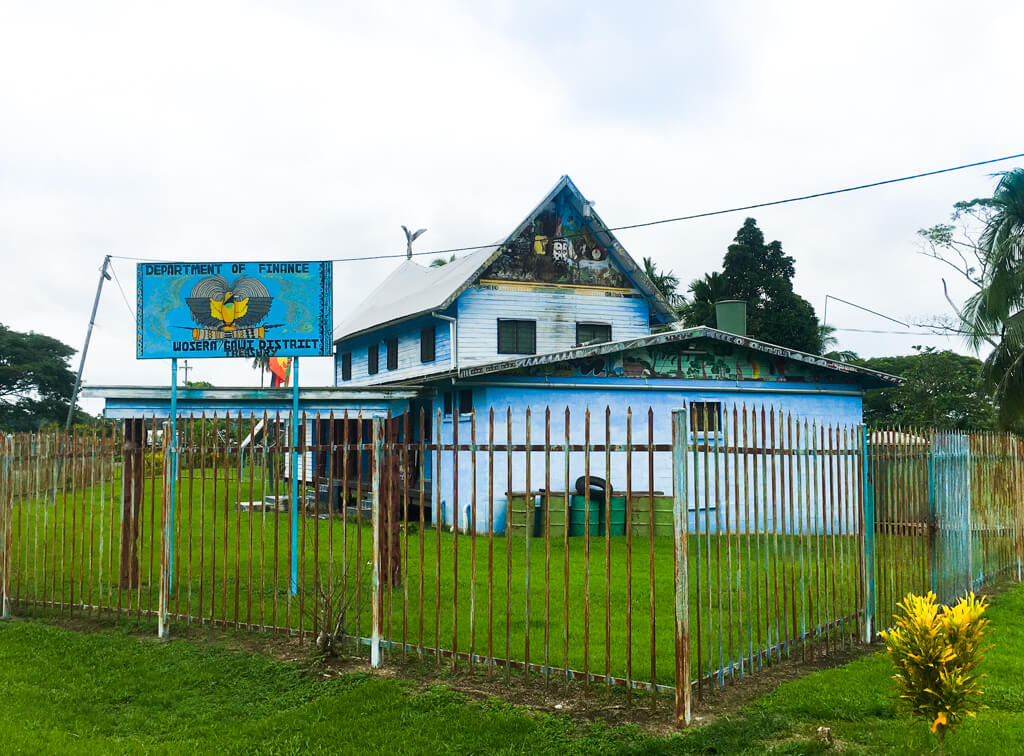
Just before we turned off the main road onto the jungle path, we saw another small village with some people milling around several hundred meters in front. “Walk quicky,” the children said, as we turned, “this is a bad village, the villagers rob people and steal their mobile phones.” I later ran this by Leo, and he sighed and said that this had happened in the past when they were drunk (notice a trend here?).
The jungle was beautiful, with ancient trees towering over the path we walked, their trunks blanketed by vines, an endless sea of deep greens in the sunshine. About halfway along the path, a couple of men with machetes passed us. I said good morning and they nodded back. Once we were past, the kids said, “They’re bad men, they also rob people”. They seemed fine to me (as I instinctively checked my pockets to make sure everything was still there). It is difficult to know how much of the constant talk of muggings and violence is true and how much is paranoia.
We walked back past the school and church, which was nondescript, but had a pretty little statue of the Virgin Mary out front. Later that evening I would meet the man who painted it, steaming drunk outside a bottle shop (liquor store) and slurring his words as he told me his story. When we reached the guest house again, the younger boy said good bye and ran off, but the older one hung around. As I was saying goodbye, he asked for five kina for cigarettes. I told him that smoking is unhealthy and I would not give him money for that. I went inside and I could see him hanging around for while still looking vaguely hopeful. I wished I had something else to give him (sometimes I bring trinkets as gifts, but after three months in Indonesia I was all out). It was a sad ending to a very nice walk.
Selfie time Trekking along the jungle path with my young guides.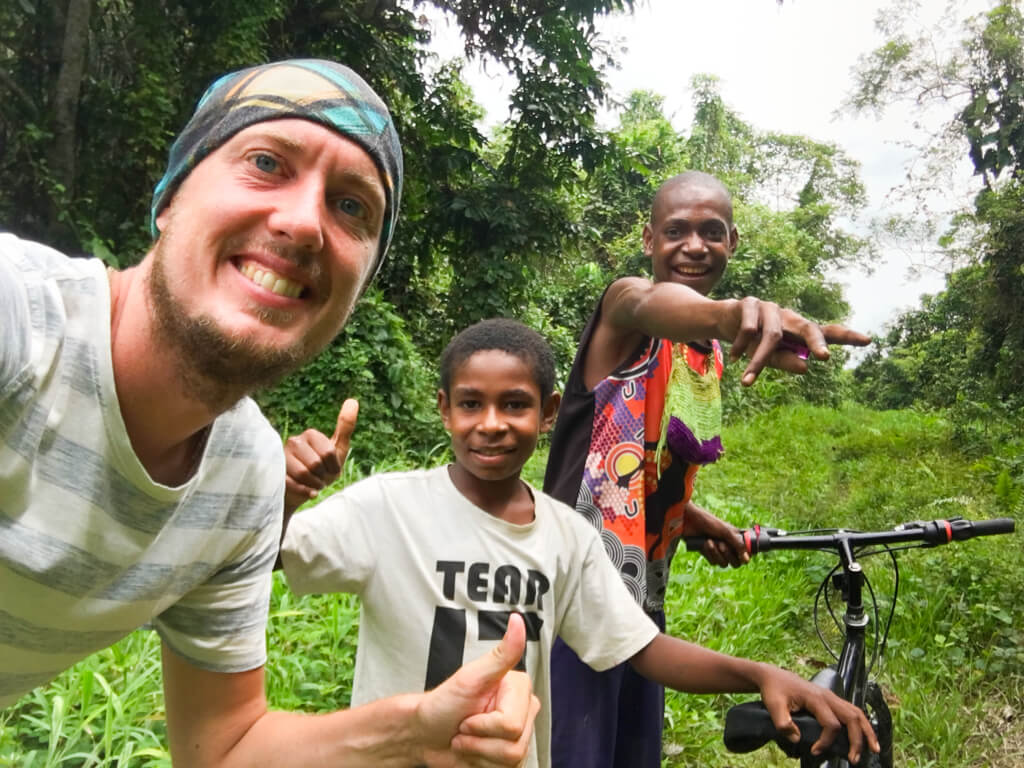
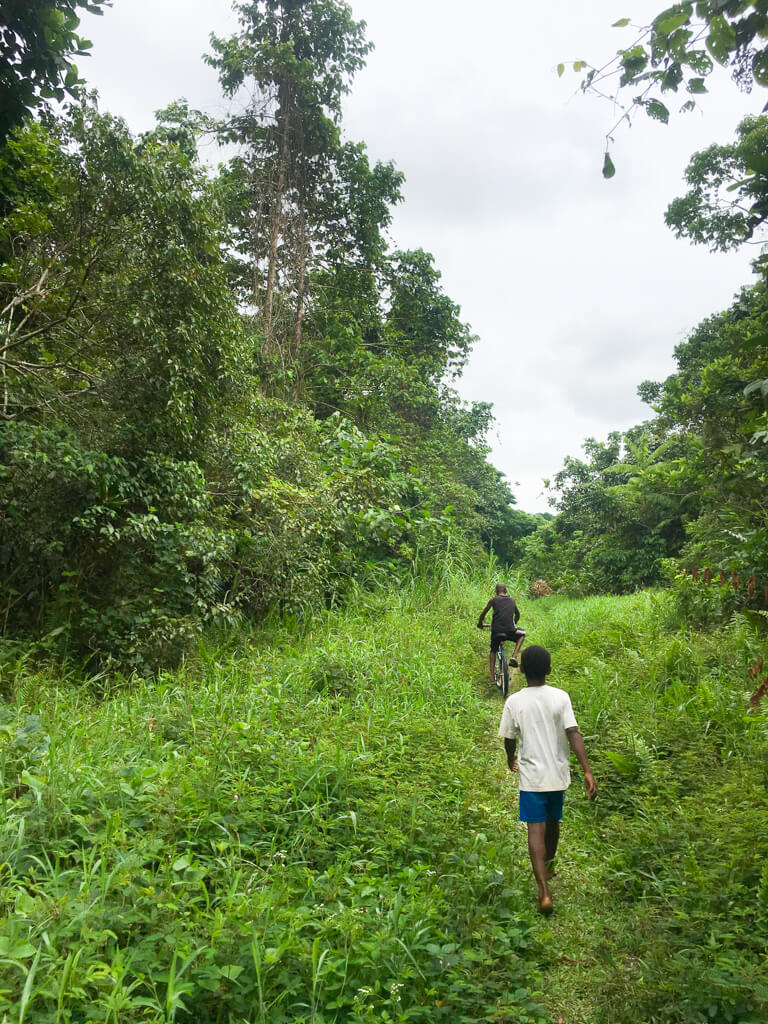
The Virgin Mary stands watch outside the village church.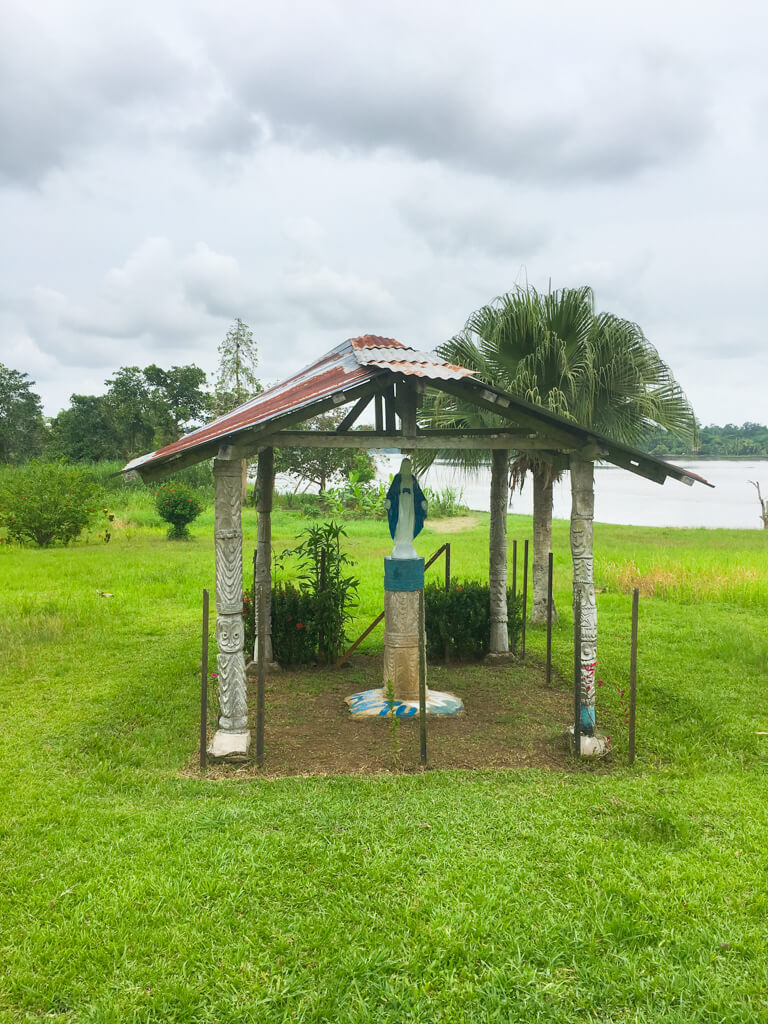
I planned to go upriver to a village called Wagu next, famous for the birds of paradise that live in the nearby jungle and are PNG’s national animal. However, Wagu is on the edge of the beautiful Lake Wagu, which lies on the white river, several kilometers off the Sepik. It isn’t even on Google Maps and is a pain in the ass to get to. Luckily, Leo had a plan for me! He happened to know a local guide called Matthew who happened to be heading that way with a couple of Swiss tourists. Leo called him and I agreed that I would take a public boat up to Ambunti village and meet him and his guests there for a ride to Wagu the next day. Sorted!
I enjoyed my time in Pagwi. Although the village itself is nothing special compared to the villages I would visit later, the local people are very friendly, the surroundings are pretty enough and I learnt a lot about local life. It’s also a comfortable place to begin a trip on the Sepik with Leo’s guest house providing cheap and convenient accommodation.
Continue the Adventure
The five weeks I spent in Papua New Guinea were one of the most amazing travel experiences of my life. If you want to read more about it, check out the following article:
Crossing the Indonesia-PNG Land Border
On Rougth Seas – Vanimo to Aitape
A Tale of Bandits and Bush Knives (Aitape to Wewak)
Useful Tips
- Public buses and PMVs to Maprik leave from about 100m down the road from the Westpac bank in Wewak, not from the main bus terminal.
- The bus from Wewak to Maprik costs 20 (€4.74/$5.67) or 25 (€5.92/$7.08) kina. It varies from bus to bus. The buses run throughout the day during the week, but they are more frequent early in the morning. On Saturday mornings they are less frequent and they do not run on Sundays.
- Leo’s guest house is the only one in Pagwi. It’s called the Sangra Guest House and costs 50 kina (€12/$14) per night. Meals theoretically cost extra, but the guys who run it are very informal and I had two meals with them for free. There actually wasn’t much alternative, because there’s not much food available in Pagwi (no restaurants at all), although you can find various snacks at the market (deep-fried dough balls, sago, fruit, etc.) and at Leo’s shop. On Sunday mornings the market finishes at about 10am, so get there early.
- As the only road to access the middle and upper Sepik arrives at the river at Pagwi, so the village probably has the most PMV (public motor vehicle) boats of any village on the river. PMVs are basically buses on the water, usually being a dugout canoe with a motor or a more modern speed boat. PMV boats run up and down the Sepik river on certain days when demand is high enough. Generally, you will find boats coming into Pagwi from both the upper and middle Sepik villages on Monday nights carrying villagers for the weekly market in Maprik, which happens every Tuesday. The boats then return to their villages on Tuesday afternoon. This means that getting to other villages from Pagwi is easiest on Tuesday afternoons and getting back there is easiest on Monday evenings. There is another market on Thursday mornings, so there are also boats from many villages on Wednesday evenings. However, as less people attend this market, sometimes there are not enough passengers to make the journey worthwhile and the boats get cancelled. Try to time your trips accordingly. Prices vary depending on the distance, how much the skipper likes you and how good you are at bargaining. However, to most of the villages that aren’t too far away (e.g., Ambunti, Palambei and Kaminimbit) the price should be between about 25 kina (€5.92/$7.08) and 40 kina (€9.47/$11.33).
- With the exception of a few charter/emergency relief planes, the only way to reach the middle and upper Sepik is from Wewak. There are regular flights to Wewak from most major cities in PNG, including Port Moresby, Lae, Madang and Vanimo (some with stops at other airports on route). Alternatively, you can brave the bandits on the road from AItape, in the north, as I did, or take a ferry from Madang.

Recent Comments